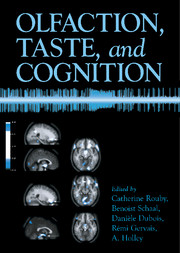Section 1 - A Specific Type of Cognition
Published online by Cambridge University Press: 21 September 2009
Summary
Olfactory experience is difficult to define: From ineffable to unmentionable, it seems to remain in the limbo of cognition. More than any artist's work, the competence of the perfumer is a challenge for explication. The few artists who are able to communicate in writing about their creative processes are mainly plasticians (painters and sculptors), musicians, and, of course, writers. As regards chemical senses, the writings are extremely rare, and the very status of “artist” is not easily conferred. As an example, Edmond Roudnitska faced a difficult task in his effort to have olfaction accepted into the realm of aesthetics.
In Chapter 1, Annick Le Guérer proposes an explanation for that misappreciation that has to do with the history of Western philosophy: Our philosophical heritage denies any nobility to olfaction and taste, as compared with the other senses, and depreciates them almost systematically. Psychoanalysis has cited that fact as evidence that civilization can be built only if there is repression of smell. However, as Le Guérer points out, the history of psychoanalysis itself is marked by fantastic representations of the nose and its functions within the relationship linking Freud and Fliess – their unconscious montre son nez in the learned conception of smell.
Moving away from the neurophysiology of smell, André Holley, in Chapter 2, looks into the perfumer's knowledge, which remains largely secret and intuitive. What is the difference between expert and novice, artist and amateur in the cognitive treatment of odors?
Information
- Type
- Chapter
- Information
- Olfaction, Taste, and Cognition , pp. 1 - 2Publisher: Cambridge University PressPrint publication year: 2002
